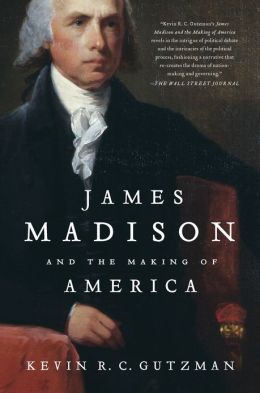Books that refer in their titles to “the making of America” should generally be avoided. The phrase is meaningless, except in the realm of nationalistic mysticism. “America” was not made—she grew. She certainly was not “made” by James Madison, who only officiously tinkered with her surface. And which “America” is meant? There have existed a number of different versions. Used in such a way, the term can only mean an imaginary America of vague sentimentality, which has never really existed.
I wish Gutzman’s book had been simply titled James Madison: A Biography, for it is a better work of historianship than its hokey title suggests. Kevin Gutzman is one of the abler young historians of the day. He is steeped in the primary sources of the Founding and early national periods, sees things that have been missed by generations of celebrity historians, and writes well, with a light touch. His biography is being billed as the new standard on its subject. There is justice in this judgment. The work is rich in context and detail, tells us all we will ever really want to know about “Little Jimmy” Madison, and is a moderate and balanced account of the subject and his times. The author understands the Virginia context, and therefore Madison, better than anyone has in a long time. The book is doubtless also a good career move, raising the author of The Politically Incorrect Guide to the Constitution to establishment respectability. In a way that is too bad, because Madison is a waste of his talents.
One of the advance endorsements of the book tells us that Madison is one of the most interesting of the Founding Fathers. That is total bosh. Little Jimmy is the least interesting of them. He is a colossal bore. If his father had not been one of the largest land and slave owners in his part of Virginia, we would never have heard of him. A tireless scribbler, his learning and understanding were pedestrian, that of a pedant, and not remotely in a class with Jefferson or John Adams or many another of the Founding Fathers. Pedestrian thinkers and pedants have elevated him to “Father of the Constitution” because his writings contribute to a false nationalistic interpretation of the Founding. In fact, Madison, who was of very junior standing among the delegates at Philadelphia, arrived with grandiose plans that were quickly shot down. He lost more votes than he won in the Convention. Pedants love him for his speculations in The Federalist, which was a partisan and disingenuous treatise that was never ratified by the people or anybody else, does not discuss the Constitution that was actually ratified as opposed to the one that was proposed, and has absolutely no legitimate standing for constitutional interpretation. Madison himself said that the Constitution should be interpreted solely by the state ratifications, which alone gave it authority.
Jefferson befriended him and used him as a sounding board, perhaps because he realized that Madison was more in touch with everyday opinion, but it was a sad day when the Democratic Republican caucus narrowly chose Little Jimmy as Jefferson’s successor over James Monroe, a far better man. Unlike Madison, Monroe was a man of sound judgment with executive, military, and diplomatic experience. Madison never went abroad, and, despite the fact that his health in his 20’s was allegedly too feeble to allow him to fight in the War of Independence, he lived into his 80’s. Most people found him dull company.
He was no great shakes as secretary of state, and as president failed completely in multiple ways. Not until George W. Bush did we have another chief executive so weak and incompetent as to allow foreigners to attack the capital while he fled to safety. Madison was always jumping back and forth. He encouraged Congress to draw up a plan of internal improvements, and then on his last day in office vetoed it. Having come into prominence opposing the first national bank, he sponsored the second one. A mere 30 years after he and Jefferson asserted the right of state interposition against unconstitutional federal acts, Madison claimed that South Carolina’s action against the tariff was not the same thing. This, as Gutzman previously has pointed out in a signal article, was a lie. (He puts it a little more politely.)
Madison’s political speculations (like the “extended republic,” the ludicrous notion of “divided sovereignty,” and the argument that the federal judiciary could never pose a problem of usurpation) are abstract and invariably have been proved wrong. His thinking is that of a professor rather than a statesman. Second-string “political philosophers” and “constitutional scholars” identify with Madison’s scribbling and fancy themselves sharing in Deep Thoughts about government. When read closely, Gutzman’s work is actually less worshipful and more realistic than most other treatments of Madison. But then, who is going to read closely? “Scholars” these days don’t read and react to books. They just find out what is fashionable to think about them and repeat it.
[James Madison and the Making of America, by Kevin R.C. Gutzman (New York: St. Martin’s Press) 432 pp., $27.99]

Leave a Reply